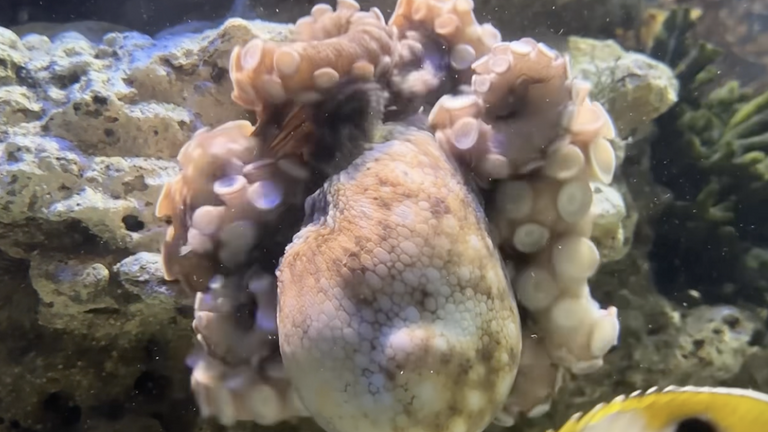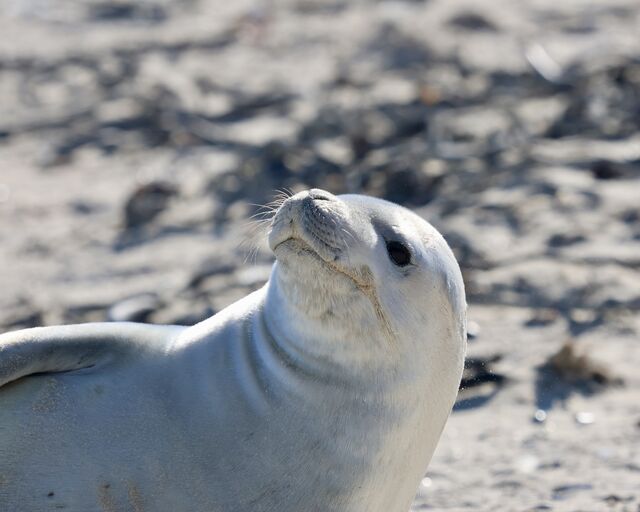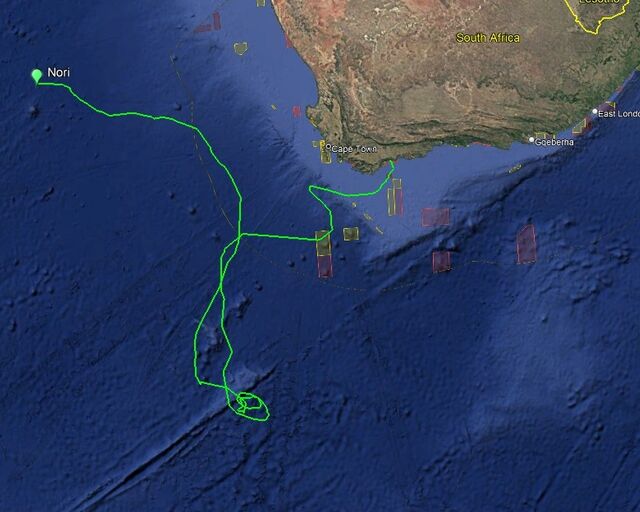This week, the world celebrated Cephalopod Week. The common octopus (Octopus vulgaris) in the Diversity Gallery is mysterious, alien, and otherworldly – you may just miss it, camouflaged against the rocks and seaweed. In celebration of Cephalopod Week, we’re highlighting these tentacled beauties!
Firstly, what are cephalopods?
Cephalopods belong to the group Cephalopoda, a term derived from the Greek meaning “head foot”. This is a perfect description of cephalopods as animals that have eyes just above their many limbs, like octopus, squid, cuttlefish, and nautilus. Found exclusively in marine environments, these arm-full invertebrates are among the most intelligent life forms in the ocean.
Here are eight things you should know about octopuses, our favourite cephalopods:
1. Showing off its suckers
Despite what you may think, the suction cups on an octopus’s tentacles are not sticky… Except when the octopus decides to grip something. Each of the suction cups has its own set of nerves and can be controlled individually at the octopus’s will! Hundreds of millions of nerves are in each tentacle, essentially giving each arm a functional brain of its own.
2. Camouflaged shapeshifters
The most famous trick of an octopus is its ability to disappear… Common octopuses are masters of shapeshifting, able to completely change their appearance in mere seconds. Using a system of colour-changing chromatophores and tiny muscles in its skin, an octopus can go from smooth white to bumpy black to red with horns and everything in between. Watch the octopus in the Diversity Gallery for a few minutes, and you’re sure to notice some changes!
3. Hygiene is key
You don’t often see the thin ends of an octopus's arms – these delicate feelers are usually tucked away, out of sight of the South African butterflyfish. However, the octopus regularly uses these thin ends to feel all over its body for parasites.
4. Posing for a photo
You know that awkward feeling when someone asks you to pose for a photo, and you don't know where to put your hands? Well, the octopus has eight to deal with and the confidence to rock them. Visitors to the Aquarium often capture stunning photos of the octopus modelling!
5. Shaking hands with an aquarist
Octopuses' tentacles do much more than grip. They are built for feeling textures, building shelters, and exploring caves. Their suction cups can taste everything they touch! The ambassador octopuses at the Aquarium learn to recognise the people that care for them by touch, not by sight.
6. Ambassador species
Octopuses, although hyper-intelligent, have very short lifespans. The common octopus may only live for two or three years, with only one opportunity to mate before they die. With this in mind, we only collect small, young octopuses to act as species ambassadors for a few months before releasing them into their natural habitat. For this reason, you may notice their sizes and personalities changing between visits – there's never a dull moment getting to know an octopus.
7. Manicure time…
Octopuses have layers on each suction cup on their tentacles called chitinous cuticles. These need to be regularly replaced to keep the tentacles in great condition. A standard grooming method involves swirling its tentacles around vigorously – this action allows the old layers of each suction cup to shed. Basically, the octopus gives itself a manicure! This practice improves grip strength and improves the octopus's ability to taste what it touches!
8. Food on the brain
You’d think that the bag-like sac that sits above the octopus’ eyes would contain its brain, but that’s where its internal organs (three hearts, gills, reproductive organs, ink sac, etc.) are held. Instead, the octopus's brain sits just behind its eyes, wrapped around the oesophagus (tube to the stomach) in a doughnut shape! When it eats, the “doughnut brain” stretches slightly when food moves down the oesophagus!
Related News
Sign up to our Newsletter
Receive monthly news, online courses and conservation programmes.


